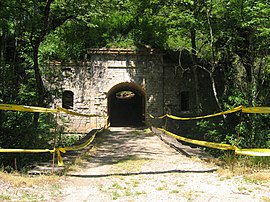Asnières-lès-Dijon
Asnières-lès-Dijon | |
|---|---|
 Fort Brûlé, an old fort in Asnières-lès-Dijon commune | |
| Coordinates: 47°23′09″N 5°02′44″E / 47.3858°N 5.0456°E | |
| Country | France |
| Region | Bourgogne-Franche-Comté |
| Department | Côte-d'Or |
| Arrondissement | Dijon |
| Canton | Fontaine-lès-Dijon |
| Intercommunality | CC Norge Tille |
| Government | |
| • Mayor (2020–2026) | Patricia Gourmand[1] |
Area 1 | 4.55 km2 (1.76 sq mi) |
| Population (2022)[2] | 1,320 |
| • Density | 290/km2 (750/sq mi) |
| Time zone | UTC+01:00 (CET) |
| • Summer (DST) | UTC+02:00 (CEST) |
| INSEE/Postal code | 21027 /21380 |
| Elevation | 274–352 m (899–1,155 ft) (avg. 331 m or 1,086 ft) |
| 1 French Land Register data, which excludes lakes, ponds, glaciers > 1 km2 (0.386 sq mi or 247 acres) and river estuaries. | |
Asnières-lès-Dijon (French pronunciation: [ɑnjɛʁ lɛ diʒɔ̃]; literally "Asnières near Dijon") is a commune in the Côte-d'Or department in the Bourgogne-Franche-Comté region of eastern France.
Geography
[edit]Asnières-lès-Dijon is located just 8 km north of Dijon. The commune lies between the D903 road which follows its western border from Dijon to Savigny-le-Sec and the D974 which follows the eastern border from Dijon and continues to Til-Châtel. The D104 links the two roads through the village and also continues east to Bellefond. The commune is mixed forest and farmland with a substantial urban area covering some 20% of the commune.[3]
Neighbouring communes and villages
[edit]History
[edit]After the defeat of France in 1870-1871, Dijon was chosen with Langres, Besançon, Reims, Laon, and La Fère to be a "second line" of the Séré de Rivières system of defence (the first line being focused on Verdun, Toul, Epinal, and Belfort). A series of forts and military redoubts centred on Dijon city were built from 1875 to 1883: la Motte-Giron, Mont-Afrique, Hauteville, Asnières, Norges, Var, Saint-Apollinaire, and Sennecey-lès-Dijon.
Built between 1876 and 1877, Fort Brûlé had the honour of suffering the first armed clash with Prussia.
Fort Brûlé did not defend Dijon during the two world wars. It was the Germans who used it as a storehouse for ammunition during the Second World War. These caused considerable damage in 1944 when the Germans blew up ammunition in the fort: so much so that with the exception of the protruding buttress on Saliant II, there is virtually nothing left of the left half of the fort.
The fort is now the property of a private owner.
The commune has had a very high level of population growth since the 1970s when it was a peaceful farming village. Many employees from the CEA at Valduc came to live there. The population of the commune increased six times in 40 years.
Heraldry
[edit] | Blazon: Azure, an ear of wheat and a bunch of grapes, stalked and leaved all in Or, isuuant from a crescent of Argent; in chief Gules charged with a crosslet bottony of Or.
|
Administration
[edit]List of Successive Mayors[4]
| From | To | Name | Party | Position |
|---|---|---|---|---|
| 2001 | 2026 | Patricia Gourmand | LR | Departmental councillor and departmental secretary of LR |
Demography
[edit]The inhabitants of the commune are known as Asniérois or Asniéroises in French.[5]
|
| ||||||||||||||||||||||||||||||||||||||||||||||||||||||||||||||||||||||||||||||||||||||||||||||||||||||||||||||||||
| |||||||||||||||||||||||||||||||||||||||||||||||||||||||||||||||||||||||||||||||||||||||||||||||||||||||||||||||||||
| Source: EHESS[6] and INSEE[7] | |||||||||||||||||||||||||||||||||||||||||||||||||||||||||||||||||||||||||||||||||||||||||||||||||||||||||||||||||||
The commune is part of the community of communes Norge et Tille.
Culture and heritage
[edit]Civil heritage
[edit]The commune has two sites which are registered as historical monuments. These are:
Religious heritage
[edit]- The Parish Church of Saint-Alban contains one item registered as a historical object:
- Eucharistic tower (14th century)
 [10]
[10]
- Eucharistic tower (14th century)
- The Parish Church of the Nativity contains several items which have been registered as historical objects:
Facilities
[edit]Asnières has shops (bakery, butcher, a small hall, and a petting zoo) and various facilities including a hall and sports grounds (tennis, football, basketball, rugby). The town also has a nursery and primary school.
It also has a Judo club - the Entente Judo Messigny-et-Vantoux - Val de Norge (Ejmn)[17]
See also
[edit]References
[edit]- ^ "Répertoire national des élus: les maires" (in French). data.gouv.fr, Plateforme ouverte des données publiques françaises. 13 September 2022.
- ^ "Populations de référence 2022" (in French). The National Institute of Statistics and Economic Studies. 19 December 2024.
- ^ a b Google Maps
- ^ List of Mayors of France (in French)
- ^ Le nom des habitants du 21 - Côte-d'Or, habitants.fr
- ^ Des villages de Cassini aux communes d'aujourd'hui: Commune data sheet Asnières-lès-Dijon, EHESS (in French).
- ^ Population en historique depuis 1968, INSEE
- ^ Ministry of Culture, Mérimée PA21000033 Fort Brûlé (in French)
- ^ Ministry of Culture, Mérimée PA00112069 Cemetery (in French)
- ^ Ministry of Culture, Palissy PM21000076 Eucharistic tower (in French)
- ^ Ministry of Culture, Palissy PM21000082 Painting: Sainte-Famille and his family (in French)
- ^ Ministry of Culture, Palissy PM21000081 Statue: Saint Claude (in French)
- ^ Ministry of Culture, Palissy PM21000080 Statue: Saint Abdon (in French)
- ^ Ministry of Culture, Palissy PM21000079 Group sculpture: Virgin of pity (in French)
- ^ Ministry of Culture, Palissy PM21000078 Retable: Apostolic cortege (in French)
- ^ Ministry of Culture, Palissy PM21000077 Statue: Virgin and child (in French)
- ^ Judo club website (in French)
External links
[edit]- Asnières-les-Dijon on the Val-de-Norge website (in French)
- Asnières-lès-Dijon on the old IGN website (in French)
- Asnières-lès-Dijon on Géoportail, National Geographic Institute (IGN) website (in French)
- Asnieres on the 1750 Cassini Map


 French
French Deutsch
Deutsch





